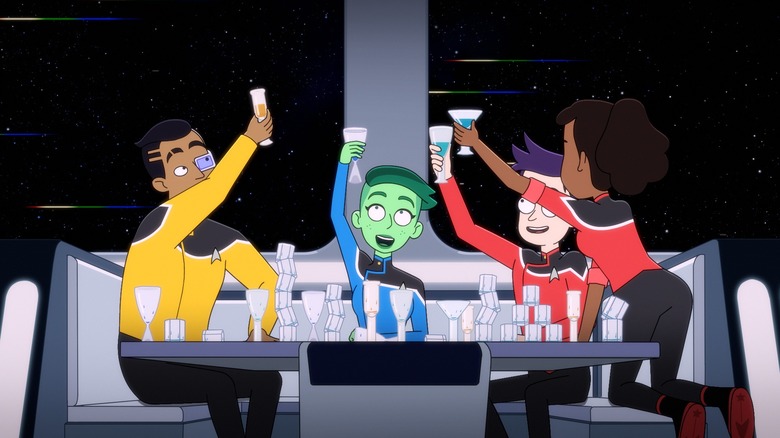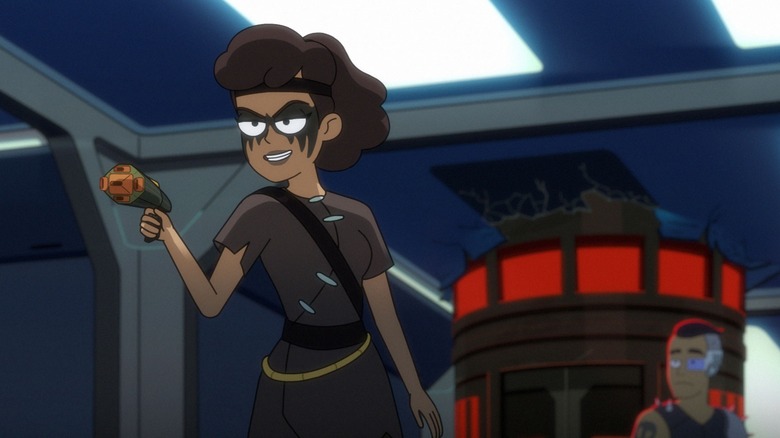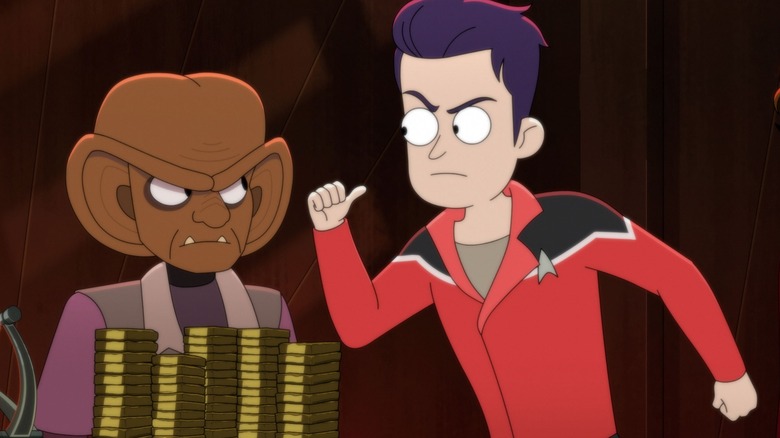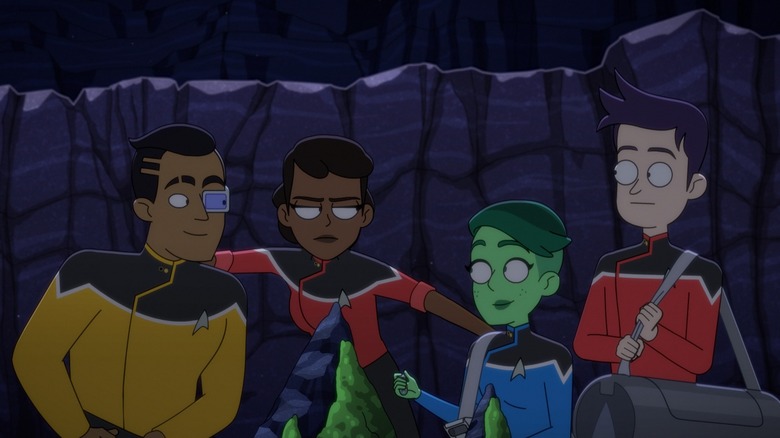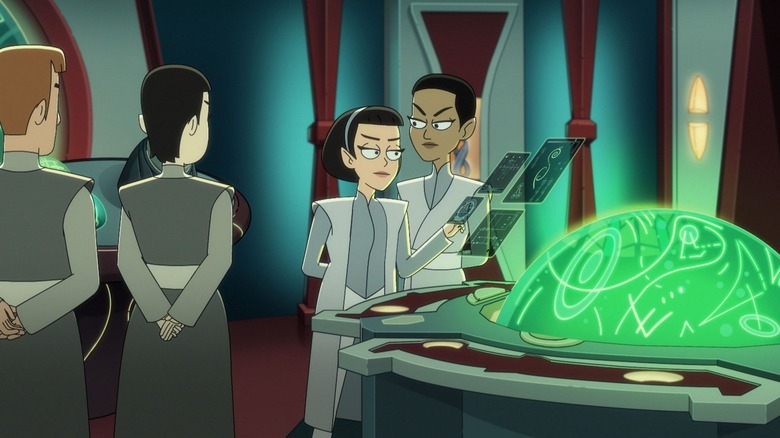The 5 Best Episodes Of Star Trek: Lower Decks, Ranked
After four years on the air and 50 episodes under its belt, "Star Trek: Lower Decks" finally signs off this week with a series finale that's as epic and exciting as anything the series has ever done. "Lower Decks" has had a rocky road to its moment of triumph; the show's adult humor and gentle ribbing of past "Trek" properties rubbed some traditionalists the wrong way before it even started, and many fans spent its first few seasons judging whether or not the show had properly proven itself as a piece of "Trek" canon.
But "Lower Decks" never wanted to be just like other "Star Trek" shows. The series is wackier than most of its predecessors, and lighter, too. In most cases, it forgoes Gene Roddenberry-style moralizing in favor of fun, bite-sized escapades, jokey commentary on the vast world of "Star Trek," and adventures that specifically benefit from its animated medium. In the end, the show earned plenty of fans thanks to its stellar voice cast, zany and occasionally envelope-pushing humor, and its commitment to the little guys who keep the world spinning.
"Star Trek: Lower Decks" has a lot of great episodes, but the team at /Film has narrowed our favorites down to a top five. Each of the following episodes is emblematic of the show's unique, goofy, surprisingly wholesome Trek-loving spirit. If they were Lower Deckers, we'd promote them, effective immediately.
5. Crisis Point
Season 1 of "Lower Decks" spent much of its time trying to prove that, as a quippy adult comedy spin on a beloved franchise, it was something more than a bunch of sardonic "Star Trek" references in a trenchcoat. By season's end, the show had earned our trust — and the chance to fully make fun of the franchise that gave it life for the length of one great, wacky episode. "Crisis Point" is colloquially remembered as the episode where Mariner (Tawny Newsome) went full Big Bad on the holodecks.
"Lower Decks" makes some of the best use of holodecks of any "Trek" show (the Mark Twain conflict resolution bit from season 4 is also excellent), and in "Crisis Point," the sitcom briefly refashions itself as an epic, high-stakes "Star Trek" movie. A frustrated, pigeonholed Mariner casts herself as the villainous Vindicta, and enacts a storyline with parallels to the not-so-classic "Next Generation" episode "Hollow Pursuits," the definitely-classic film "Wrath of Khan," and several other touchstones from the past 60-plus years of "Trek." Cinematic, meta, and funny with a bit of satirical bite, "Crisis Point" shows that "Lower Decks" can hang with the rest of the franchise when it wants to — even if it prefers to goof off with the Lower Deckers more often than not.
4. Hear All, Trust Nothing
While "Crisis Point" paid homage to the "Trek" movies of decades past, season 3's "Hear All, Trust Nothing" built on a pre-existing slice of "Trek" canon — specifically, the "Deep Space Nine" era — and brought it into the future with irreverent humor and due respect. The episode intertwines real character development (we see Mariner struggle to fit in with her girlfriend's friends and Tendi shy away from pirate talk) with a very funny visit to Deep Space 9, where they encounter money-loving Ferengi Quark (Armin Shimerman) and Bajoran leader Kira Nerys (Nana Visitor).
The "Lower Decks" take on "Deep Space Nine" rocks in part because the comedy knows how to highlight aspects of the shows that came before it that were never fully explored — from a comedy angle or otherwise. This would come up again later when, in its penultimate episode, "Lower Decks" confirmed that Bashir (Alexander Siddig) and Garak (Andrew Robinson) are a couple. In "Hear All, Trust Nothing," though, the show focuses on the kidnapping of Quark, who now has a whole franchise of bars. As Danielle Ryan pointed out in a /Film essay on the episode, "Hear All, Trust Nothing" features Quark's recognizably shrill scream, the return of bar regular Morn, and references to Jake Sisko, dabo, and the "Deep Space Nine" dartboard. "Lower Decks" has never aimed to make fun of its predecessors, and this cameo-filled return to one of the franchise's best shows makes it clear that every joke the show makes is made with love and attention.
3. Caves
It's rare for a show to hit its comedic stride in a later season, but for my money, season 4 of "Star Trek: Lower Decks" is the funniest of the entire bunch. The show's penultimate season is full of memorable moments, from an encounter with bone-sucking cutie-pie Moopsy in menagerie-themed "I Have No Bones Yet I Must Flee" to Rutherford (Eugene Cordero) and Tendi's (Noël Wells) hyper-romantic undercover mission in "Parth Ferengi's Heart Place." But few episodes of the entire series hit the comedic and creative highs of "Caves," the late-season outing in which Tendi, Mariner, Rutherford, and Boimler (Jack Quaid) get trapped in a cave full of ever-growing moss and reminisce about all their other dicey cave excursions.
"Caves" takes a frame narrative structure and uses it to deliver four self-contained, entertaining stories, all of which play around with the long "Star Trek" legacy of freaky organic life forms found in caves. Boimler's story features an unpleasant trip taken alongside Lieutenant Levy (Fred Tatasciore), a crackpot whose conspiracies are proven true when Vendorians, the funky octopus-like beings that haven't been seen since "The Animated Series," make a reappearance. In Mariner's story, she befriends the misunderstood Delta Shift, a group of Lower Deckers who run parallel to the protagonists we know and love. But it's Rutherford's story that really takes the cake. In it, he gets impregnated by a mysterious guide, gives birth to her clone baby, and raises it with Dr. T'Ana (Gillian Vigman) while the pair wander the cave.
The fact that Rutherford is so laid back that he never bothered to mention this to anyone until now is hilarious, but the episode has as much heart as humor. Tendi tells the final story, reminding the bickering team, apparently on the brink of falling apart, that they bonded when they got stuck together on her first day of work. "Caves" is a classic: wholesome, funny, weird, creatively structured, and perfectly in tune with the "Trek" favorites that came before it.
2. Fully Dilated
As the only "Trek" show featuring a crew with an encyclopedic obsession with past "Star Trek" heroes, it's sometimes hard to pinpoint what "Lower Decks" itself feels like — independent of its many references. If the show's curious, sassy, pure of heart essence was ever perfectly captured over the course of a single episode, it may have been "Fully Dilated," the fifth-season standout that sees Mariner, Tendi, and T'lyn (Gabrielle Ruiz) trapped on an undercover mission for an entire year. The reason? Boimler and Rutherford spilled micheladas on the transporter interface two seconds after the group beamed down.
"Trek" has done time dilation — the idea that the passage of time is different on one planet than another — before, but the show makes the concept its own with the flawlessly executed shrimp cocktail fiasco. While the three Starfleet officers await transport off of Dilmer III, cultivating science projects (in T'lyn's case), growing increasingly paranoid (in Tendi's case), and doing jail time (Mariner, naturally) in the interim, we're continually shown cuts back to the transporter room, where the endearingly idiotic boys waste precious seconds wiping sauce and booze into the control panel with their own shirts. The premise is simultaneously ambitious and stupid in the best way.
It's a great bit, but "Fully Dilated" has something even better up its sleeve: the severed head of Data (Brent Spiner), the "Next Gen" favorite whose presence always elevates any "Trek" project in which he appears. Paramount+ era "Trek" has a tendency to deliver brief fan service cameos, but this isn't that. Instead, Data is incorporated beautifully into Tendi's storyline, giving her reassurance about her insecurities over a possible promotion and telling her that he knows how it feels to be the first of your kind to break new ground. Spiner imbues his voice role with a sense of quiet comfort (even when Tendi goes full Dr. Frankenstein), and the pair's commiseration as two marginalized people in spaces that aren't built for them is one of the most profound moments in the entire series. "Fully Dilated" recognizes the power of time to either pull people apart or help them grow together, and in the end, the women of the Cerritos choose to have each others' backs. This is "Star Trek: Lower Decks" (briefly) at its most sincere, and it's a joy to watch.
1, wej Duj
After spending the better part of two seasons with the Cerritos crew, "Star Trek: Lower Decks" finally expanded its purview to other lower deckers across the galaxy with "wej Duj." The tremendous episode examines the lives of underlings working on the Klingon vessel IKS Che'Ta' and the Vulcan cruiser Sh'vhal, offering a rare perspective shift to remind viewers that Starfleet isn't the beginning and end of life — or workplace politics — in the "Star Trek" universe.
"wej Duj" isn't just an experimental one-off; the episode culminates with a climax that has repercussions for all three space crews, and it makes the interconnectedness of all beings in the "Trek" world — from the beloved Vulcans to the rarely fleshed-out Klingons — apparent. The episode was nominated for a Hugo Award for its achievement in science fiction, and it's the rare "Lower Decks" outing that expands upon "Trek" canon in a serious way. On the Che'Ta', warrior Ma'ah (Jon Curry) bucks the in-series stereotype of the savage Klingon by championing more logical and honorable ways of engaging in combat — an idea that gets him called a wannabe Vulcan and nearly killed. On the Sh'vhal, meanwhile, T'lyn is chided for seeking wisdom outside the precepts set forth by Vulcan tradition, and she causes a stir by citing a Klingon concept.
More than a simple story about cultural exchange and solidarity, "wej Duj" is a riveting episode full of space battles and showdowns, Vulcan cattiness and universal folly. T'lyn is a lovingly-written anchor for the story about bucking the status quo. While her colleagues' insistence that she seems overly emotional when she sounds totally monotone is funny, there's also something powerful and somber about her journey away from inflexible tradition and towards a dynamic way of thinking. Vulcans and Klingons are two of the most-used species in "Trek" history, but there are still blind spots and contradictions in their lore; "we Duj" fills in those gaps with a thoughtful, well-scripted, cinematic story that, dare I say, boldly goes where "Trek" never has before.
